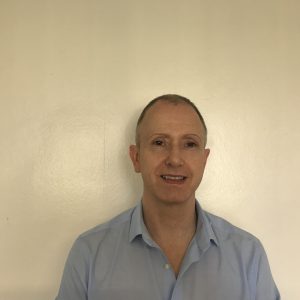
Dennis Davison is the Associate Director for Secure Care Services at Cumbria, Northumberland, Tyne and Wear NHS Foundation Trust (CNTW).
His role is to look at service and business development, safety, quality, patient and carer experience, financial aspects and staff wellbeing.
“We work with a number of governing bodies to make sure service delivery is in line with national practice for secure mental health and people with learning disabilities and complex needs,” Dennis explained.
Dennis began his career as a student nurse at what was then Prudhoe Hospital in 1987. After qualifying three years later, he started working with people with learning disabilities who had physical health, profound learning disabilities and required total care needs to be met by nurses.
These people were one of the first groups of patients deemed as not requiring care to be delivered in hospital and were supported to live in the community in the first wave of changes to care for people with a learning disability.
Soon after, he moved to Scotland and worked in a number of areas as a registered nurse. It wasn’t long before he became a clinical team lead, the equivalent to Ward Manager.
A job as a community team leader led Dennis back to the North East. He then moved back into a hospital setting and was involved in opening up the first female learning disability and mental health assessment and treatment service, something he describes as one of the proudest moments of his career.
Alongside his role as Associate Director, Dennis has also supported the Trust with the development of physical health treatment and is the Trust lead for end-of-life care.
Dennis was inspired to go into nursing after volunteering at St George’s Park in his school days.
“I also volunteered at a local school helping children with learning disabilities and my sister was a student nurse at Northgate Hospital,” he said. “I wanted to apply for nursing as soon as I was old enough.”
For Dennis, the best thing about working with people with learning disabilities is looking at a person’s holistic needs.
“Lots of people with learning disabilities don’t use words and express themselves in different ways,” he said. “Being able to help people develop small gains that makes their lives more fulfilling is extremely rewarding.
“Learning disability services can sometimes get a bad press but once you see the difference you can make, it makes you strive to deliver the best you can.”
Dennis has seen many changes in his career, the biggest being a bigger focus on community care.
He said: “I’ve had the privilege of working in both a hospital and community setting, and I would advise anyone thinking of going into learning disability nursing to gain experience in other areas, so you have a holistic skill set.
“From an organisational perspective, we are encouraged to develop and it’s always positive when you can see growth.”
